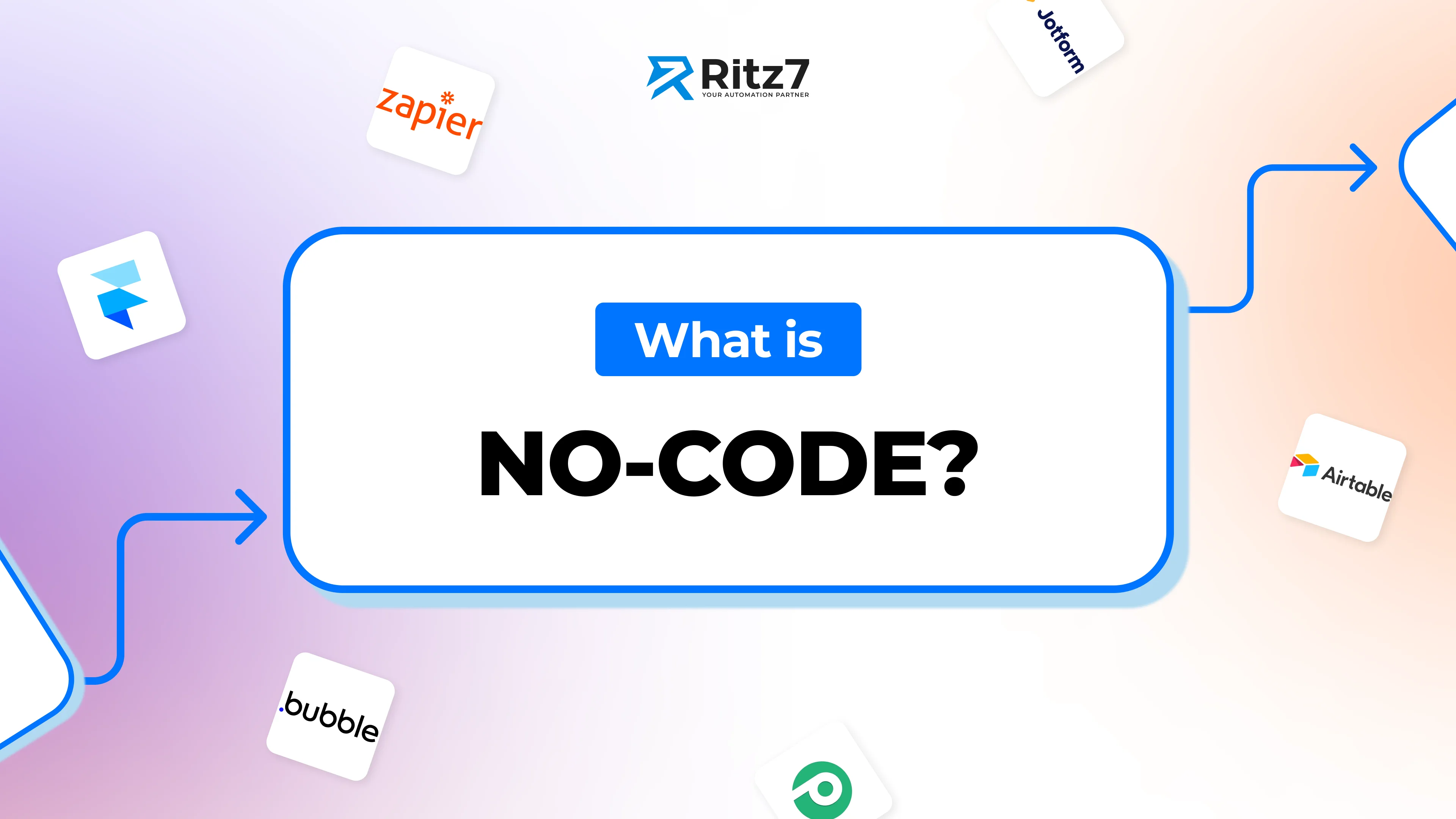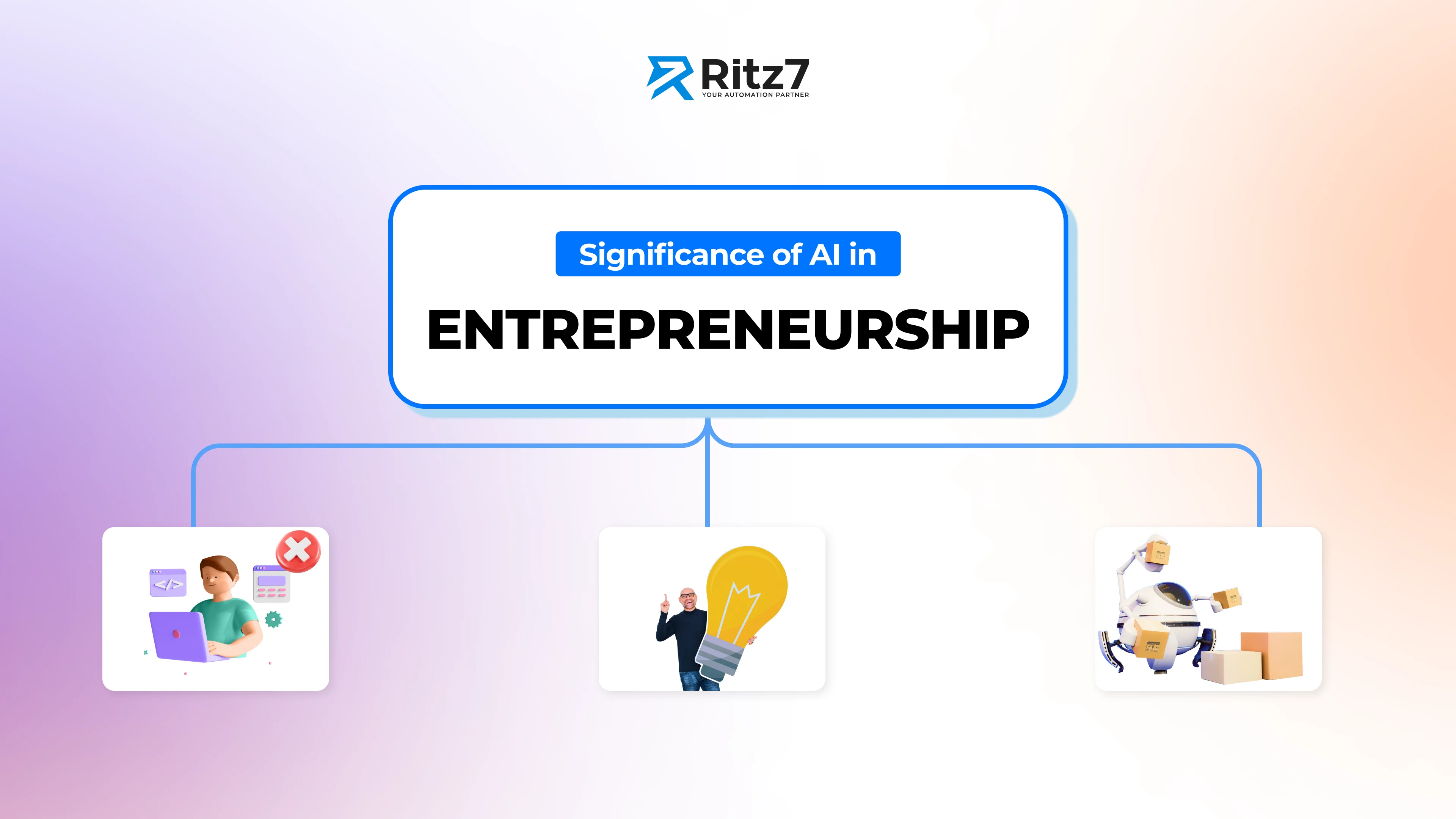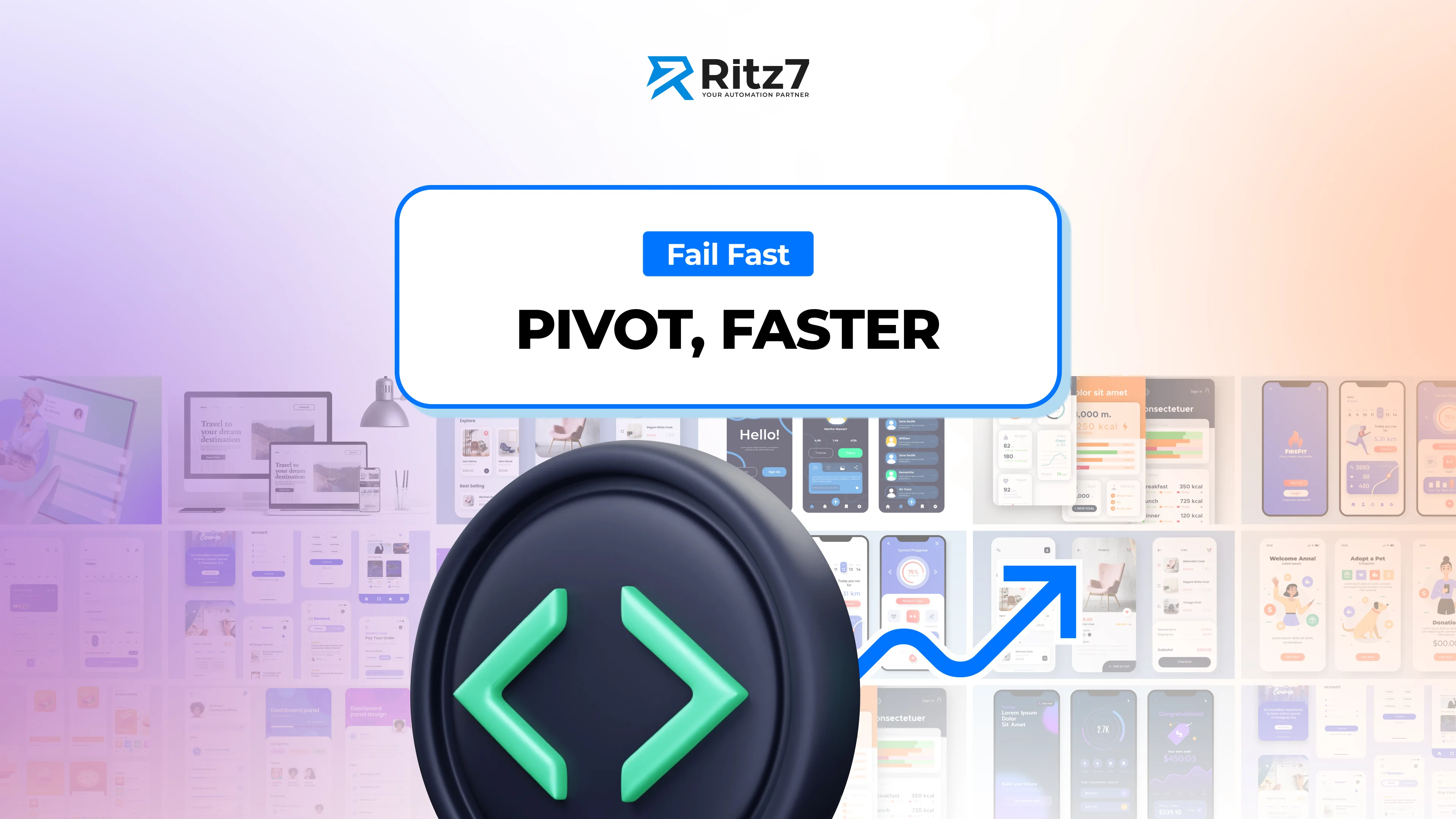Why Learning No-Code is Essential for Entrepreneurs in 2025
Feb 3, 2025
Table of Contents
What is No-Code and Why Does It Matter?
Why No-Code Matters for Entrepreneurs
How AI and Automation Are Transforming Entrepreneurship
No Developers Needed
Instantly Turn Ideas Into Reality
Automate to Scale
Fail Fast, Pivot Faster
What Does Fail Fast, Pivot Faster Mean?
Fail Fast
Pivot Faster
Top Projects Entrepreneurs Can Build with AI-Powered Tools
Dashboards
Marketplaces
Automation Tools
Booking Systems
Plugins
Why No-Code Skills Are Essential for Entrepreneurs?
Create AI-Driven Applications Without Coding
Start Freelancing or Build an Agency
Launch a Startup Without Funding
Gain Hands-On Experience with AI
Conclusion
In 2025, the ability to build, automate, and scale a business without writing a single line of code is becoming one of the most valuable skills for entrepreneurs. No-code tools are revolutionizing application development, allowing business owners to create software applications, automate workflows, and integrate AI-driven solutions without needing actual programming languages.
With platforms like Bubble, Zapier, Make, and Webflow, entrepreneurs can leverage AI-driven tools, machine learning models, predictive models, and building models to develop practical AI solutions without hiring expensive software engineers.
The low-code and no-code development approach is reshaping industries by offering intuitive tools that streamline product launches, accelerate MVP creation, and automate business workflows.
This article explores why codeless skills are essential for entrepreneurs and how the Fail Fast, Pivot Faster mindset helps businesses adapt quickly. By leveraging AI application development, AI software development, and custom software solutions, entrepreneurs can build scalable and efficient software solutions.
The growing demand for enterprise software solutions highlights the need for no-code automation, software engineering tools, and mobile development tools to streamline business operations and drive innovation.
What is No-Code and Why Does It Matter?

Low-code and No-code development allows users to build software solutions using AI application development, AI software development, and custom software solutions. These platforms use visual interfaces, drag-and-drop tools, and pre-built components instead of traditional actual programming languages. This approach eliminates the need for coding experience, making enterprise software solutions more accessible, cost-effective, and flexible.
Why No-Code Matters for Entrepreneurs
No Developers Needed – Entrepreneurs can create their own no-code apps without hiring a development team.
Speed – The no-code approach accelerates product launches, helping businesses execute ideas faster.
Cost-Effectiveness – Codeless software significantly reduces development costs compared to traditional software engineering approaches.
Flexibility – Entrepreneurs can modify and iterate on their apps in real-time without waiting for developers.
Practical Experience – Entrepreneurs gain hands-on experience in building real-world solutions using no-code platforms.
Customer Experience – Codeless tools help businesses design user-friendly interfaces, improving customer retention and engagement.
Also Read - No-code automation: How Quickload Saves $120k | Ritz7
How AI and Automation Are Transforming Entrepreneurship

1. No Developers Needed
Before no-code platforms, launching a tech startup required hiring developers or learning actual programming languages. Today, no-code AI tools allow entrepreneurs to integrate machine learning models and create intelligent solutions without writing a single line of code.
Example:
A startup founder wants to create a Recommendation System for personalized content. Instead of hiring a software engineering team, they use AI platforms to build and deploy a codeless machine learning model within their application.
2. Instantly Turn Ideas Into Reality
With automation, entrepreneurs can design, test, and launch products quickly. Generative AI features in codeless solutions enable businesses to build apps without code efficiently.
Example:
A business owner wants to create a services marketplace for freelance consultants. Using Bubble’s user-friendly interface, they can design a codeless MVP build with user profiles, integrated payment systems, and an automated booking system—all without coding.
3. Automate to Scale
Automation plays a crucial role in business scalability. No-code tools streamline operations by eliminating manual tasks, allowing businesses to operate more efficiently.
Example:
A company automates its application process using codeless automation software. When a customer submits a request, the system:
Updates the CRM automatically.
Sends a confirmation email.
Assigns the request to a team member—all without human intervention.
This intelligent solution increases efficiency and improves the overall customer experience.
4. Fail Fast, Pivot Faster
One of the most critical advantages of no-code is the ability to test ideas quickly and cheaply. Entrepreneurs can launch an MVP (Minimum Viable Product), gather user feedback, and make necessary adjustments without sinking significant resources.
Must Read - Sales motivation Dashboard: Track Performance & Commissions
What Does Fail Fast, Pivot Faster Mean?

The concept of Fail Fast, Pivot Faster encourages entrepreneurs to test their ideas in the real world quickly. Instead of spending months perfecting a product that might not resonate with users, entrepreneurs can launch a basic version, identify what works (and what doesn’t), and pivot accordingly.
Fail Fast
Build a minimum viable product (MVP) using no-code tools.
Test it with a small group of users.
Identify flaws, gaps, or areas of improvement.
Example:
A founder creates a subscription-based e-learning app using Glide. After launching the MVP, they discover that users want live Q&A features. They can quickly integrate this functionality without rebuilding the app from scratch.
Pivot Faster
Based on user feedback, make data-driven changes to the product.
Adjust business models, features, or target audiences as needed.
Relaunch improved versions swiftly.
Example:
A niche marketplace built on Bubble fails to attract sellers. The entrepreneur pivots by adding marketing tools for sellers, making the platform more appealing.
Also Read - Guide to No-Code Automation for Service Businesses
Top Projects Entrepreneurs Can Build with AI-Powered Tools

Advancements in AI-powered predictive models, automation, and engineering have made it easier than ever for entrepreneurs to build digital solutions without extensive technical expertise. Whether you’re launching a startup, automating workflows, or improving existing systems, these five project types offer endless opportunities for decision-making and optimization.
1. Dashboards
Why It’s Useful:
Businesses rely on dashboards for decision-making, tracking performance, and visualizing key metrics. A well-designed dashboard provides real-time analytics, enabling teams to make informed business decisions efficiently.
Example:
A startup founder develops an admin dashboard using AI-powered predictive models. This dashboard integrates sales reports, customer feedback, and operational data, providing a practical application for tracking performance and optimizing business strategies. With machine learning models, businesses can forecast trends, allocate resources effectively, and maximize profitability—all within one centralized platform.
2. Marketplaces
Why It’s Useful:
Online marketplaces play a vital role in the digital economy by facilitating seamless transactions between buyers and sellers. Entrepreneurs can develop platforms that enhance customer experience while streamlining sales processes.
Example:
An entrepreneur launches a peer-to-peer rental marketplace where users can list and rent outdoor gear. Using AI-powered software, they integrate secure payment processing, automated booking systems, and customer review functionalities, making the application process smooth and user-friendly. With predictive models, the platform suggests pricing recommendations based on demand and seasonality, ensuring accurate price predictions for users.
3. Automation Tools
Why It’s Useful:
Automation tools enhance customer experience by eliminating manual processes, saving businesses time, and increasing productivity. AI-driven automation solutions help manage repetitive tasks like email scheduling, data entry, and workflow optimization.
Example:
A marketing agency builds an AI-powered workflow automation system that schedules social media posts, sends email follow-ups, and updates the CRM. The system integrates machine learning models to analyze engagement patterns and suggest the best times to post, optimizing marketing performance. By leveraging engineering and AI-powered predictive models, businesses can scale their automation strategies more effectively.
4. Booking Systems
Why It’s Useful:
Industries like healthcare, fitness, and education require seamless booking systems that enhance customer experience. Automated scheduling tools prevent overbooking, manage availability, and streamline application processes for service providers.
Example:
A yoga instructor develops an AI-enhanced booking system where clients can schedule sessions, process payments, and receive automated reminders. The system uses AI-powered predictive models to identify peak booking times and suggest personalized session slots for clients. This practical application eliminates manual coordination and improves scheduling efficiency for both customers and businesses.
5. Plugins
Why It’s Useful:
Enhance Digital Tools with Custom Features. Engineering innovative plugins can extend the capabilities of existing platforms by integrating Natural Language Processing (NLP) and machine learning models into applications. Plugins allow businesses to customize their software solutions without needing complex software engineering tools.
Example:
A freelancer develops an NLP-based plugin for Bubble users, allowing them to integrate AI-powered chatbots and Recommendation Systems into their applications. This enhances customer experience by providing automated responses, personalized recommendations, and text analysis. By leveraging pre-built algorithms, businesses can process large datasets efficiently and deliver intelligent AI-powered solutions without requiring extensive development work.
Must Read - Business Process Automation Hack: How Hubble Saved $70k
Why No-Code Skills Are Essential for Entrepreneurs?

No-code skills allow entrepreneurs to build and scale digital products, automate workflows, and integrate AI solutions without requiring a background in programming. Whether you're launching a startup, offering services as a freelancer, or experimenting with AI-powered applications, no-code tools provide the flexibility and accessibility needed to succeed. Here’s why these skills are crucial for entrepreneurs today:
1. Create AI-Driven Applications Without Coding
AI is changing the way businesses interact with customers, process data, and make decisions. Traditionally, integrating AI into applications required complex coding and expertise in machine learning techniques. No-code AI tools now allow entrepreneurs to add AI-powered predictive models and Natural Language Processing (NLP) capabilities without writing a single line of code.
Example:
A travel startup wants to enhance its search recommendations to provide personalized trip suggestions. Instead of hiring a data scientist, they use Google Cloud’s NLP services through a codeless AI tool to analyze user preferences and deliver tailored travel recommendations. This improves customer experience while making the platform smarter and more efficient.
2. Start Freelancing or Build an Agency
No-code development skills open up new income opportunities for entrepreneurs who want to offer software solutions to businesses. Instead of relying on traditional software engineers, companies are now hiring no-code developers to build custom applications, automation tools, and AI-driven solutions.
Example:
A freelancer with no-code expertise specializes in prompt engineering and feature engineering for businesses that need AI-powered predictive models. A financial services company hires them to create an AI tool that analyzes investment trends and provides recommendations—without requiring custom coding.
3. Launch a Startup Without Funding
Starting a business usually requires significant investment, especially when hiring developers to build digital products. No-code automation platforms eliminate the need for venture capital by allowing entrepreneurs to create, test, and launch their ideas at a fraction of the cost.
Example:
A solopreneur wants to build a subscription-based online marketplace where digital creators can sell templates, courses, and services. Instead of spending thousands on development, they use codeless software tools to build the platform, integrate payments, and automate subscriptions—launching their business without external funding.
4. Gain Hands-On Experience with AI
No-code platforms provide practical experience for entrepreneurs who want to experiment with AI-driven applications but lack a technical background. By working with visual interfaces and pre-built AI tools, business owners can explore the potential of AI without learning programming languages.
Example:
A SaaS founder wants to improve the business intelligence dashboard of their software application. Using AI-powered predictive models, they enhance reporting features, enabling businesses to analyze trends and make data-driven decisions—all without hiring an AI specialist.
Also Read - Discount Voucher: Boon for Online Booking Systems
Conclusion
The no-code movement is empowering business professionals to create AI-driven applications, automate workflows, and build scalable digital products faster than ever. From marketplaces to automation tools, no-code solutions are unlocking new opportunities for entrepreneurs worldwide.
Entrepreneurs who master no-code software engineering will lead the way in digital transformation, creating practical AI solutions with apps without code that solve real-world problems.



